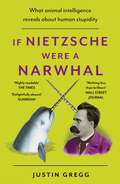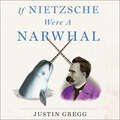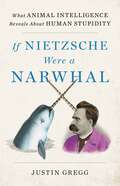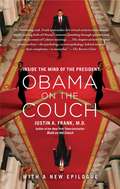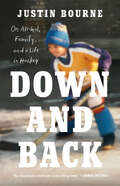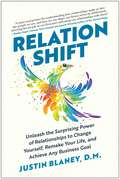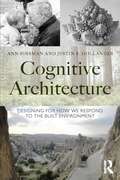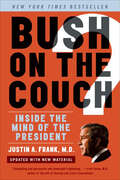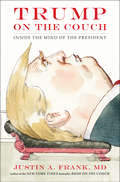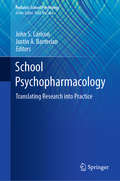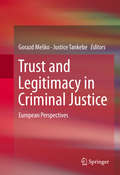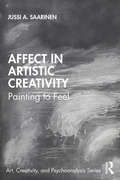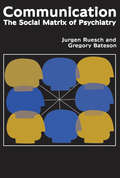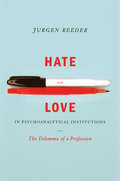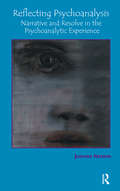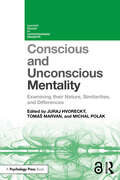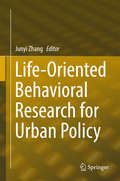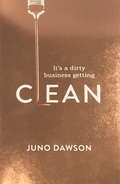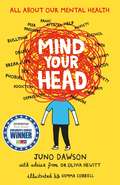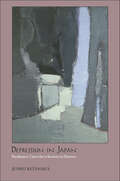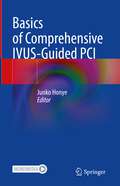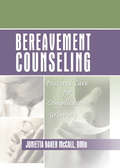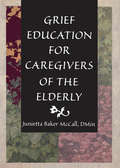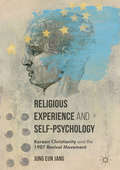- Table View
- List View
If Nietzsche Were a Narwhal: What Animal Intelligence Reveals About Human Stupidity
by Justin GreggWhat if human intelligence is actually more of a liability than a gift? After all, the animal kingdom, in all its diversity, gets by just fine without it. At first glance, human history is full of remarkable feats of intelligence, yet human exceptionalism can be a double-edged sword. With our unique cognitive prowess comes severe consequences, including existential angst, violence, discrimination, and the creation of a world teetering towards climate catastrophe. What if human exceptionalism is more of a curse than a blessing?As Justin Gregg puts it, there's an evolutionary reason why human intelligence isn't more prevalent in the animal kingdom. Simply put, non-human animals don't need it to be successful. And, miraculously, their success arrives without the added baggage of destroying themselves and the planet in the process.In seven mind-bending and hilarious chapters, Gregg highlights features seemingly unique to humans - our use of language, our rationality, our moral systems, our so-called sophisticated consciousness - and compares them to our animal brethren. What emerges is both demystifying and remarkable, and will change how you look at animals, humans, and the meaning of life itself.
If Nietzsche Were a Narwhal: What Animal Intelligence Reveals About Human Stupidity
by Justin GreggA MYTH-BUSTING EXPOSÉ OF HOW HUMAN INTELLIGENCE MAY BE MORE A LIABILITY THAN A GIFT AND A REFRESHING NEW WAY TO UNDERSTAND THE ANIMAL KINGDOM AND OUR PLACE ON EARTH.What if human intelligence is actually more of a liability than a gift? After all, the animal kingdom, in all its diversity, gets by just fine without it. At first glance, human history is full of remarkable feats of intelligence, yet human exceptionalism can be a double-edged sword. With our unique cognitive prowess comes severe consequences, including existential angst, violence, discrimination, and the creation of a world teetering towards climate catastrophe. What if human exceptionalism is more of a curse than a blessing?As Justin Gregg puts it, there's an evolutionary reason why human intelligence isn't more prevalent in the animal kingdom. Simply put, non-human animals don't need it to be successful. And, miraculously, their success arrives without the added baggage of destroying themselves and the planet in the process.In seven mind-bending and hilarious chapters, Gregg highlights features seemingly unique to humans - our use of language, our rationality, our moral systems, our so-called sophisticated consciousness - and compares them to our animal brethren. What emerges is both demystifying and remarkable, and will change how you look at animals, humans, and the meaning of life itself.(P) 2022 Hachette Audio
If Nietzsche Were a Narwhal: What Animal Intelligence Reveals About Human Stupidity
by Justin GreggThis funny, "extraordinary and thought-provoking" (The Wall Street Journal) book asks whether we are in fact the superior species. As it turns out, the truth is stranger—and far more interesting—than we have been led to believe.If Nietzsche Were a Narwhal overturns everything we thought we knew about human intelligence, and asks the question: would humans be better off as narwhals? Or some other, less brainy species? There&’s a good argument to be made that humans might be a less successful animal species precisely because of our amazing, complex intelligence. All our unique gifts like language, math, and science do not make us happier or more &“successful&” (evolutionarily speaking) than other species. Our intelligence allowed us to split the atom, but we&’ve harnessed that knowledge to make machines of war. We are uniquely susceptible to bullshit (though, cuttlefish may be the best liars in the animal kingdom); our bizarre obsession with lawns has contributed to the growing threat of climate change; we are sexually diverse like many species yet stand apart as homophobic; and discriminate among our own as if its natural, which it certainly is not. Is our intelligence more of a curse than a gift? As scientist Justin Gregg persuasively argues, there&’s an evolutionary reason why human intelligence isn&’t more prevalent in the animal kingdom. Simply put, non-human animals don&’t need it to be successful. And, miraculously, their success arrives without the added baggage of destroying themselves and the planet in the process. In seven mind-bending and hilarious chapters, Gregg highlights one feature seemingly unique to humans—our use of language, our rationality, our moral systems, our so-called sophisticated consciousness—and compares it to our animal brethren. Along the way, remarkable tales of animal smarts emerge, as you&’ll discover: &“A dazzling, delightful read on what animal cognition can teach us about our own mental shortcomings.&” —Adam Grant The house cat who&’s better at picking winning stocks than actual fund managers Elephants who love to drink Pigeons who are better than radiologists at spotting cancerous tissue Bumblebees who are geniuses at teaching each other soccer What emerges is both demystifying and remarkable, and will change how you look at animals, humans, and the meaning of life itself. San Francisco Chronicle bestseller • BOOKRIOT Best Books of the Year • Next Big Idea Book Club Best Science Books of the Year &“I love the book, and everyone should read it.&” —Ryan Holiday "Undeniably entertaining." —TheNew York Times
Obama on the Couch: Inside the Mind of a President
by Justin FrankEven though he's three years into his term as President, many Americans feel like they don't know the "real" Barack Obama. From the idealistic campaigner who seemed to share our dreams, and who promised to fulfill our lofty expectations, to pragmatic politician who has repeatedly compromised on the promises of his campaign, it indeed seems as though there are two Obamas. What to make of this? How can the electorate get a better sense of its commander-in-chief, and how can the President more effectively lead a nation in a moment of turmoil and crisis? These questions are of great interest to most Americans, but the questions - and their potential answers - are especially intriguing for a psychiatrist eager to diagnose and help cure the ills that plague our country. Here, Justin Frank, M.D. ,a practicing psychoanalyst and the author of the New York Times bestseller Bush on the Couch - brings a new patient into his office, and the results of his sessions are not only fascinating, but they provide valuable insights that will help readers in their frustrating pursuit of the President's character. Obama's transformation over the course of his brief but incredibly well-examined political career has left some supporters disillusioned and has further frustrated opponents. To explore this change in behavior, and Obama's seeming inability to manage the response to his actions, Dr. Frank delves into his past, in particular, the President's turbulent childhood, to paint a portrait of a mixed-race child who experienced identity issues early in life, further complicated by his father's abandonment. As he addresses everything from Obama's approach to health care reform, his handling of the Gulf Oil spill, to his Middle East strategies, Dr. Frank argues that the President's decisions are motivated by inner forces - in particular, he focuses on Obama's overwhelming need to establish consensus, which can occasionally undermine his personal--and his party's--objectives. By examining the President's memoirs, his speeches, and his demeanor in public, Dr. Frank identifies the basis for some of his confusing or self-defeating behavior. Most significantly, he looks at the President's upbringing and explores the ways in which it has shaped him--and what this means for our nation and its future. Obama is a complex and mysterious figure who inspires many questions and great interest from Republicans, Democrats, and from the rabid 24-hour news cycle; this book provides what everyone's been looking for: an intriguing and provocative assessment of the President's strengths, weaknesses, and even what could be called his destructive tendencies, ultimately drawing connections that will enable readers to interpret recent history in revealing new ways. As Obama's first term comes to a close, speculation about the future will only grow more intense; Obama on the Couch will give average citizens and pundits alike a way to help all of us anticipate what the President will do next--and what the future of our country might hold. Dr. Justin Frank, a highly regarded national expert on psychoanalysis, is a clinical professor in the Department of Psychiatry at George Washington University Medical Center. He is a sought-after teacher and lecturer on psycho-political life in America. His numerous publications and media appearances range from articles in popular magazines to the New York Times-bestselling book, Bush on the Couch (HarperCollins 2004). Dr. Frank lives in Washington, DC with his wife and their two Portuguese Water Dogs, neither of which is related to Bo Obama.
Down and Back: On Alcohol, Family, and a Life in Hockey
by Justin BourneFor readers of Nine Lessons I Learned from My Father and Hockey Confidential, Down and Back tells broadcaster Justin Bourne&’s story of following his Hall-of-Fame father not only to the NHL, but also into rehab.Bob Bourne was everything a son wants to emulate—an NHL All-Star, a Sports Illustrated &“Sportsman of the Year,&” a Stanley Cup champion. Justin Bourne followed in those huge footsteps, leading his teams in scoring year after year, and finally garnering an invitation to the New York Islanders&’ training camp—the same team his father had played for. But Bourne was also following his father down a darker path.Though he hadn&’t begun drinking until he was 21, by 36 his drinking had nearly swamped his career and his marriage. In an act of brutal self-honesty—which may not have been possible if not for his understanding of how lying spurred by alcoholism can cause a family pain—Bourne got help, got sober, and confronted what his father and the game mean to him.Down and Back is a frank and unflinching appraisal of the game and Bourne&’s relationship with it: the violence and danger, the booze and drugs, the consequences of fame. But it is also an honest look at what is redeeming about the sport, through the eyes of someone who grew up in NHL dressing rooms, who has skated on NHL ice as both a player and a coach, and who inherited the game from a man he&’s grown to better understand by looking more closely at himself.
Relationshift: Unleash the Surprising Power of Relationships to Change Yourself, Remake Your Life, and Achieve Any Business Goal
by Justin BlaneyLearn to leverage your relationships so you can dream bigger, achieve whatever you want, and build a life that makes you happier with each passing day. No greater force for change exists than the people we surround ourselves with. Relationshift explores how the people in your life have colored your worldview, how this limits or expands your options, and what to do about it. Through the stories of British explorer Gertrude Bell, abolitionist hero Frederick Douglass, music icons the Beastie Boys, and many others, this book will help you: Learn how to connect with high-caliber people who can help you go further in life. Understand the rules of life as handed down through countless generations—then learn how to recognize which ones can be bent. Grow in happiness, thankfulness, peace, and contentment while eliminating the power of negative emotions. Explore how our minds reject new concepts like our bodies reject viruses. Build a personal tribe that can help you achieve any goal in work, health, or relationships. Make better choices by learning to see your options more clearly and honing your ability to move quickly with less information. Identify relationships that have the most impact on your wellbeing, for better or worse. Discover and refine the direction of your life by exploring wisdom from twenty experts on purpose. With dozens of illustrations and practical examples, Relationshift will help you take greater control of your life and uncover a path to your best possible future.
Cognitive Architecture: Designing for How We Respond to the Built Environment
by Ann Sussman Justin B Hollander*Winner of the Environmental Design Research Association 2016 Place Research Award!* In Cognitive Architecture, the authors review new findings in psychology and neuroscience to help architects and planners better understand their clients as the sophisticated mammals they are, arriving in the world with built-in responses to the environment that have evolved over millennia. The book outlines four main principles---Edges Matter, the fact people are a thigmotactic or a 'wall-hugging' species; Patterns Matter, how we are visually-oriented; Shapes Carry Weight, how our preference for bilateral symmetrical forms is biological; and finally, Storytelling is Key, how our narrative proclivities, unique to our species, play a role in successful place-making. The book takes an inside-out approach to design, arguing that the more we understand human behavior, the better we can design for it. The text suggests new ways to analyze current designs before they are built, allowing the designer to anticipate a user's future experience. More than one hundred photographs and drawings illustrate its key concepts. Six exercises and additional case studies suggest particular topics - from the significance of face-processing in the human brain to our fascination with fractals - for further study.
Bush on the Couch: Inside the Mind of the President
by Justin A. FrankWith the Bush administration in permanent crisis, a renowned Washington psychoanalyst updates his portrait of George W.'s public persona—and how it has damaged the presidency.Insightful and accessible, courageous and controversial, Bush on the Couch sheds startling new light on George W. Bush's psyche and its impact on the way he governs, tackling head-on the question few seem willing to ask: Is our president psychologically fit to run the country? With an eye for the subtleties of human behavior sharpened by thirty years of clinical practice, Dr. Justin A. Frank traces the development of Bush's character from childhood through his presidency, identifying and analyzing his patterns of thought, action, and communication. The result is a troubling portrait filled with important revelations about our nation's leader—including disturbing new insights into:How Bush reacted to the 2006 Democratic sweep in Congress with a new surge of troops into IraqHis telling habits and coping strategies—from his persistent mangling of English to his tendency to "go blank" in the midst of crisisThe tearful public breakdown of his father, George H. W. Bush, and what it says about the former president's relationship to his prominent sonsThe debacle of Katrina—the moment when Bush's arrogance finally failed himWith a new introduction and afterword, Bush on the Couch offers the most thorough and candid portrait to date of arguably the most psychologically damaged president since Nixon.
Trump on the Couch: Inside the Mind of the President
by Justin A. Frank"A great public service--critical for our time."--Bandy X. Lee, M.D., M.Div., Yale psychiatrist, expert on violence, and editor of The Dangerous Case of Donald TrumpThe New York Times-bestselling author of Bush on the Couch shows that Donald Trump is mentally and emotionally unfit to execute the duties of President.No president in the history of the United States has inspired more alarm and confusion than Donald Trump. As questions and concerns about his decisions, behavior, and qualifications for office have multiplied, they point to one primary question: Does he pose a genuine threat to our country? The American Psychiatric Association's Goldwater Rule constrains psychiatrists from offering diagnoses on public figures who are not patients and who have not endorsed such statements. But in Trump on the Couch Clinical Professor of Psychiatry Justin A Frank invokes the moral responsibility that compels him to speak out and present a full portrait of a man who presents us with a clear and present danger.Using observations gained from a close study of Trump's patterns of thought, action, and communication, Dr. Frank uncovers a personality riddled with mental health issues. His analysis is filled with important revelations about our nation's leader, including disturbing insights into his childhood, his family, his business dealings, and his unusual relationship with alternative facts, including how * The absence of a strong maternal force during childhood has led to Trump's remarkable lack of empathy and disregard for women's boundaries; * His compulsion to polarize America has grown out of the way he perceives the world as full of deceitful and destructive persecutors; * His inability to tolerate the pain of frustration has triggered his belief that omnipotence will finally remove it; * His idiosyncratic use of language points to larger issues than even his tweets might suggest.With our country itself at stake, Dr. Frank calls attention to the underlying narcissism, misogyny, deception, and racism that drive the President who endangers it. A penetrating examination of how we as a nation got here and, more important, where we are going, Trump on the Couch sounds a call to action that we cannot ignore.
School Psychopharmacology: Translating Research into Practice (Pediatric School Psychology)
by John S. Carlson Justin A. BarterianThis book provides a research-based overview of the use of psychotropic medications in combination with psychosocial interventions to improve learning, social interactions, and behavioral functioning of children within the school setting. It details implementation strategies for delivering multimodal treatments to school-aged children with psychiatric diagnoses while coordinating services across educational and health service sectors. In addition, it includes case studies on ADHD, conduct disorder, depression, social anxiety, autism spectrum disorder, bipolar disorder, and psychosis, with overviews of treatment plans, targeted goals and behaviors, classroom-based medication evaluation plans, and treatment responses communicated back to the child’s family and physician. The book concludes with an overview of integrated behavioral health and the benefits of care coordination to school-aged children experiencing social, emotional, and behavioral challenges. Topics featured in this text include:Legal, ethical, and professional issues related to the use of psychotropic medications in school-aged populations.Effective medications for treating mood dysregulation disorders in school-aged youth.Medications for internalizing and externalizing disorders.Common side effects of psychotropic medication in school-aged populations.The need to be culturally sensitive when considering treatment plans for school-aged youth. School Psychopharmacology is an essential resource for researchers, graduate students, and other professionals in child and school psychology, social work, psychiatry, psychopharmacology, special and general education, public health, and counseling.
Trust and Legitimacy in Criminal Justice
by Gorazd Meško Justice TankebeThe book explores police legitimacy and crime control, with a focus on the European region. Using comparative case studies, the contributions to this timely volume examine the effects of a transition to democracy on policing, public attitudes towards police legitimacy, and the ways in which perceptions of police legitimacy relate to compliance with the law. Following these case studies, the authors provide recommendations for improving police legitimacy and controlling crime, in these particular sociopolitical environments, where the police are often associated with previous military or paramilitary roles. The techniques used by these researchers may be applied to studies for policing in other regions, with potential applications within Europe and beyond. Chapters present topical issues of crime, crime control and human emotions regarding crime, criminals, law enforcement and punishment in contemporary societies. This book will be of interest to researchers in criminology and criminal justice, as well as political science and public policy. This book is highly recommended for anyone interested in procedural justice and legitimacy, encounters between citizens and the state, the effectiveness of governmental institutions, and democratic development. It stands alone in its broad, cross-national contributions to understanding these issues. -Wesley G. Skogan, PhD, Professor of Political Science, Northwestern University, Chicago, IL, USA
Affect in Artistic Creativity: Painting to Feel (Art, Creativity, and Psychoanalysis Book Series)
by Jussi SaarinenWhy do painters paint? Obviously, there are numerous possible reasons. They paint to create images for others’ enjoyment, to solve visual problems, to convey ideas, and to contribute to a rich artistic tradition. This book argues that there is yet another, crucially important but often overlooked reason. Painters paint to feel. They paint because it enables them to experience special feelings, such as being absorbed in creative play and connected to something vitally significant. Painting may even transform the painter’s whole sense of being. Thus, painting is not only about producing art, communicating content, and so on, but also about setting up and inhabiting an experiential space wherein highly valued feelings are interactively enabled and supported. This book investigates how and why this happens by combining psychoanalytical theorization on creativity with philosophical thinking on affectivity. It focuses on creative experience itself, and illuminates the psychological mechanisms and dynamics that underlie the affects at stake. Painters’ own descriptions of how they feel at work are used throughout to give an accurate, true-to-life portrayal of the experience of painting. The strength of the book lies in its open-minded yet critical integration of contemporary psychoanalytic and philosophical thinking, and in its truthfulness to painters’ experiential descriptions of the painterly process. On the whole, it enriches our understanding of artistic creativity and sheds more light on how and why we come to feel the things we do. As such, the book will appeal to philosophers, psychoanalysts, and art researchers alike.
Communication: The Social Matrix of Psychiatry
by Gene Combs Gregory Bateson Jurgen Ruesch Eve C. PinskerThe integration of psychiatry into the mainstream of American society following World War II involved rethinking and revision of psychiatric theories. While in the past, theories of personality had been concerned with the single individual, this pioneering volume argues that such theories are of little use. Instead, the individual must be seen in the context of social situations in which rapid advances in communication technology have brought people closer together, changing their behavior and self-expression. Ruesch and Bateson show that following World War II mass communication and culture have become so pervasive that no individual or group can escape their influences for long. Therefore, they argue that processes of psychoanalysis must now consider the individual within the framework of a social situation. Focusing upon the larger societal systems, of which both psychiatrist and patient are an integral part, they develop concepts that encompass large-scale events as well as happenings of an individual nature. They have outlined this relationship in a unified theory of communication, which encompasses events linking individual to individual, individual to the group, and ultimately, to events of worldwide concern. The term "social matrix," then, refers to a larger scientific system, of which both the psychiatrist and the patient are integral parts. Jurgen Ruesch was professor of psychiatry at the University of California School of Medicine and director of the section of Social Psychiatry at the Langley Porter Neuropsychatric Institute in San Francisco. Gregory Bateson taught at Columbia University, the New School for Social Research, Harvard University, Stanford University, and the University of California, Santa Cruz. Among his books are "Naven", "Steps to an Ecology of Mind, Mind and Nature: A Necessary Unity", "Angels Fear: Towards an Epistemology of the Sacred", and "A Sacred Unity: Further Steps to an Ecology of Mind".
Hate and Love in Pyschoanalytical Institutions
by Jurgen ReederIn Hate and Love in Psychoanalytic Institutions, Jurgen Reeder investigates the professional superego of the psychoanalyst. This superego designates a prescriptive and prohibiting role that the individual must play within the parameters of a certain occupational sphere.The prescriptive aspect works like a professional ideal, and in this respect the superego can be said to sustain a professional 'ethos' or spirit, commanding what the professional should know, and what his or her relations to clients and colleagues should resemble. It helps to bind the members of the analytical community together.The prohibiting aspect installs a vigilant inner eye. It offers necessary protection against detrimental aberrations, but it also evokes fantasies of critical or condemning colleagues who might have insight into what transpires within the walls of the analyst's own private practice--leading to a reluctance to communicate openly about the analytical experience. In this sense, the professional superego contributes to the 'paranoization' of collegial communication, a circumstance that has a hampering effect on spontaneity and creativity in both clinical and theoretical work. Jurgen Reeder's groundbreaking research, uncovering the dynamics of the professional superego in psychology, psychotherapy, and psychoanalysis, can be applied to other professions as well, including social work, medicine, education, law, and the ministry.
Reflecting Psychoanalysis: Narrative and Resolve in the Psychoanalytic Experience
by Jurgen ReederAt the heart of this book is an ethical question: 'With what legitimacy do I assume the right to interpret my fellow being?' This question is raised in the context of a critique of a particular hermeneutic interpretation of psychoanalysis, namely, psychoanalysis as an objectifying discipline in which the other (the analysand) is regarded quintessentially as a representation or exterior object to be understood. The author embraces the fundamental intersubjectivity of psychoanalytic experience. Intersubjectivity is viewed as the human encounter within the psychoanalytic setting where there occurs a mutual influencing or acting upon, rather than an encounter guided by an essentially objectivating scientific knowledge. Truth in this conception is not a cumulatively acquired possession, but an always-emerging process coiled within an interpretative dialectic occurring between human beings. This is a thoughtful, nuanced, clearly articulated and challenging book that engages directly with the perceived crisis of psychoanalysis.
Conscious and Unconscious Mentality: Examining their Nature, Similarities, and Differences (Current Issues in Consciousness Research)
by Juraj HvoreckýIn this collection of essays, experts in the field of consciousness research shed light on the intricate relationship between conscious and unconscious states of mind. Advancing the debate on consciousness research, this book puts centre stage the topic of commonalities and differences between conscious and unconscious contents of the mind. The collection of cutting-edge chapters offers a breadth of research perspectives, with some arguing that unconscious states have been unjustly overlooked and deserve recognition for their richness and wide scope. Others contend that significant differences between conscious and unconscious states persist, highlighting the importance of their distinct characteristics. Explorations into the nature of the transition from unconscious to conscious mind further complicate the picture, with some authors questioning whether a sharp divide between unconscious and conscious states truly exists. Delving into ontological, epistemological, and methodological issues, this thought-provoking text challenges established paradigms and paves the way for a reimagining of consciousness research. It does so in an understandable and accessible way, making this a perfect companion for both experts and students of philosophy, psychology, and related fields. Chapters 2, 4, 9, 10, 14 and 16 of this book are freely available as downloadable Open Access PDFs at http://www.taylorfrancis.com under a Creative Commons Attribution-Non Commercial-No Derivatives (CC-BY-NC-ND) 4.0 license.
Life-Oriented Behavioral Research for Urban Policy
by Junyi ZhangThis book presents a life-oriented approach, which is an interdisciplinary methodology proposed for cross-sectoral urban policy decisions such as transport, health, and energy policies. Improving people's quality of life (QOL) is one of the common goals of various urban policies on the one hand, while QOL is closely linked with a variety of life choices on the other. The life-oriented approach argues that life choices in different domains (e. g. , residence, neighborhood, health, education, work, family life, leisure and recreation, finance, and travel behavior) are not independent of one another, and ignorance of and inability to understand interdependent life choices may result in a failure of consensus building for policy decisions. The book provides evidence about behavioral interdependencies among life domains based on both extensive literature reviews and case studies covering a broad set of life choices. This work further illustrates interbehavioral analysis frameworks with respect to various life domains, along with a rich set of future research directions. This book deals with life choices in a relatively general way. Thus, it can serve not only as a reference for research, but also as a textbook for teaching and learning in varied behavior-related disciplines.
Clean
by Juno DawsonWhen socialite Lexi Volkov almost overdoses, she thinks she's hit rock bottom. She's wrong.Because rock bottom is when she's forced into an exclusive rehab facility.From there, the only way is up for Lexi and her fellow inmates, including the mysterious Brady.As she faces her demons, Lexi realises love is the most powerful drug of all ... It's a dirty business getting clean.Addiction, redemption, love and despair. Clean is Gossip Girl meets Girl, Interrupted, and it will have you hooked from the very first page. 'I loved it' Marian Keyes'One to just enjoy' Stylist'An emotional freight train of a novel' Heat 'As bold and gritty as it is fabulously glossy and readable' Observer
Clean: The London Collection
by Juno DawsonFall into the lives of the city's filthy rich with Juno Dawson's deliciously dark and intoxicating London Collection. When socialite Lexi Volkov almost overdoses, she thinks she's hit rock bottom. She's wrong.Because rock bottom is when she's forced into an exclusive rehab facility.From there, the only way is up for Lexi and her fellow inmates, including the mysterious Brady.As she faces her demons, Lexi realises love is the most powerful drug of all ... It's a dirty business getting clean.Addiction, redemption, love and despair. Clean is Gossip Girl meets Girl, Interrupted, and it will have you hooked from the very first page.
Mind Your Head
by Juno DawsonFrom the critically acclaimed author of THIS BOOK IS GAY, James Dawson, now writing as Juno DawsonFrom the critically acclaimed author of THIS BOOK IS GAY, James Dawson, now writing as Juno Dawson. We all have a mind, so we all need to take care of our mental health as much as we need to take care of our physical health. And the first step is being able to talk about our mental health. Juno Dawson leads the way with this frank, factual and funny book, with added information and support from clinical psychologist Dr Olivia Hewitt. Covering topics from anxiety and depression to addiction, self-harm and personality disorders, Juno and Olivia talk clearly and supportively about a range of issues facing young people's mental health - whether fleeting or long-term - and how to manage them. With real-life stories from young people around the world and witty illustrations from Gemma Correll.
Depression in Japan: Psychiatric Cures for a Society in Distress
by Junko KitanakaSince the 1990s, suicide in recession-plagued Japan has soared, and rates of depression have both increased and received greater public attention. In a nation that has traditionally been uncomfortable addressing mental illness, what factors have allowed for the rising medicalization of depression and suicide? Investigating these profound changes from historical, clinical, and sociolegal perspectives, Depression in Japan explores how depression has become a national disease and entered the Japanese lexicon, how psychiatry has responded to the nation's ailing social order, and how, in a remarkable transformation, psychiatry has overcome the longstanding resistance to its intrusion in Japanese life. Questioning claims made by Japanese psychiatrists that depression hardly existed in premodern Japan, Junko Kitanaka shows that Japanese medicine did indeed have a language for talking about depression which was conceived of as an illness where psychological suffering was intimately connected to physiological and social distress. The author looks at how Japanese psychiatrists now use the discourse of depression to persuade patients that they are victims of biological and social forces beyond their control; analyzes how this language has been adopted in legal discourse surrounding "overwork suicide"; and considers how, in contrast to the West, this language curiously emphasizes the suffering of men rather than women. Examining patients' narratives, Kitanaka demonstrates how psychiatry constructs a gendering of depression, one that is closely tied to local politics and questions of legitimate social suffering. Drawing upon extensive research in psychiatric institutions in Tokyo and the surrounding region, Depression in Japan uncovers the emergence of psychiatry as a force for social transformation in Japan.
Basics of Comprehensive IVUS-Guided PCI
by Junko HonyeThis practical guidebook describes all aspects of the Intravascular Ultrasound (IVUS) for percutaneous coronary intervention (PCI), sharing many tips & tricks for the basic to advanced use of the technology in daily clinical practice. Chapters describe in detail how to interpret several IVUS findings to apply for PCI strategies, help readers understand the pathogenesis in different cases, as well as the mechanisms of PCI. Practical approaches to performing effective PCI will be discussed with case presentations. Chapters outline many practical topics such as reviewing the IVUS images demonstrating plaque characteristics. Also, a hot topic in stentless PCI, and a special section on the relationship between IVUS measurements and physiological assessments including fractional flow reserve (FFR). Basics of Comprehensive IVUS-Guided PCI is a book to be read by PCI operators, interventional fellows, and staff such as radiology technicians, clinical engineering technicians, and nurses in catheterization laboratories. It also attracts engineers and sales representatives working at medical companies who are curious about IVUS-guided PCI. The authors are experts of IVUS-guided PCI and they will broaden the understanding of the technology to entry level to intermediate operators.
Bereavement Counseling: Pastoral Care for Complicated Grieving
by Harold G Koenig Junietta B MccallGet a unique insight into health, bereavement, and healing! Bereavement Counseling: Pastoral Care for Complicated Grieving is a practical guide to the assessment and treatment of complicated grief responses, using a pastoral approach that combines clinical and spiritual care. The book addresses current theory, observations, and experience, and examines changing approaches and developing standards of practice. The author, an ordained minister with an extensive background in pastoral counseling, integrates spirituality into the grieving process by focusing on the partnership between spirituality and healing, the resources of spiritual practices, and the functions of counseling and spiritual/pastoral psychotherapy. By providing usable treatment strategies, sharing standard interventions, and promoting technical skill for caregivers, Bereavement Counseling: Pastoral Care for Complicated Grieving places sustained emphasis on giving voice to grief and recovery. The author draws from more than 20 years&’ experience in ministry, teaching, supervision, consultation, and therapy to present stories, vignettes, and poetry that give depth and life to the grieving process. These vignettes provide a unique insight into health, bereavement, and healing and create a living context for maintaining a person-centered focus that promotes meaning and leads to positive outcomes. The book provides templates as assessment and treatment planning aids and includes an extensive bibliography of up-to-date journal articles that reflect the latest research in the field. Topics addressed in Bereavement Counseling: Pastoral Care for Complicated Grieving include: universal grief processes and responses dysfunctional grieving therapies and treatment priorities reorganization and recovery how perceptions, thoughts, and belief influence care and much more! Bereavement Counseling: Pastoral Care for Complicated Grieving is a practical resource for clergy, pastoral care specialists, and anyone needing to help others bear with the pain of grief, process loss, gain new insight and meaning, and experience a renewed sense of healing and connection.
Grief Education for Caregivers of the Elderly
by Harold G Koenig Junietta B MccallThrough firsthand accounts and research, Grief Education for Caregivers of the Elderly focuses on the education, training, and support of individuals who care for the elderly. This book provides caregivers with methods to cope with grief and loss and will help educators design programs that meet the needs of their consumers: the elderly and their families, friends, and service providers. From Grief Education for Caregivers of the Elderly, you'll learn how to cope with the stress and emotions of caregiving and improve the quality of services to your patients. With an emphasis on caregivers of the institutionalized elderly and the special services provided by clergy, chaplains, and pastoral counselors, Grief Education for Caregivers of the Elderly offers the caregiver or educator several model workshops focusing on grief, loss, and bereavement care. Grief Education for Caregivers of the Elderly contains proven methods and strategies that will sharpen and enhance your caregiving skills, including: focusing on the emotional responses and phases of dying, including denial, anger, and acceptance, to help patients deal with death considering physical and administrative atmosphere and your elderly population when setting goals and designing workshops to provide optimal patient/resident care discussing the themes of grief and loss, stress management, handling change, and promoting self-care for caregivers in workshops and through self-evaluations developing workshops that open with grief history surveys and attitude checklists, discuss normative development and issues of old age, and have themes based on the biological, psychosocial, and spiritual needs of the elderly person providing caregivers with an opportunity to practice what they have learned through case studies, simulated role play, open discussions, and care plan designing thinking about your own mortality and learning about your feelings and ideas of growing oldUtilized at a psychiatric nursing home facility of New Hampshire Hospital, the workshop exercises in Grief Education for Caregivers of the Elderly have allowed caregivers to express personal feelings; talk about beliefs and experiences; learn about biological, psychosocial, and spiritual processes of grief and phases of bereavement; and apply these understandings and insights into typical caregiving situations. Grief Education for the Caregivers of the Elderly gives you the framework for such a program, using vignettes, composite case material, poetry, and a holistic approach to health care to emphasize the importance of your emotional health and enhanced care of the elderly.
Religious Experience and Self-Psychology: Korean Christianity and the 1907 Revival Movement
by Jung Eun JangThis book explores the 1907 Korean Revival Movement from a self psychological perspective. The examination of the psychological processes in the movement based on Heinz Kohut's self psychology can shed light on religious experiences as selfobject experiences by identifying the sense of defeatedness and helplessness that Korean people experienced under Japanese occupation as what Kohut calls self-fragmentation of the Korean group self and explaining its therapeutic functions which facilitate potential for the narcissistic nourishment of the fragmented group self leading to renewed self-esteem, transformation, and empowerment of the Korean people. Korean people in the early 1900s experienced abuses and oppression by corrupt officials and exploitation by Japanese government. Through religious experiences which emphasized the individual repentance, the experience of God through the spirit, emphasis on prayer, and eschatological faith, the Korean Revival Movement in 1907 enabled its followers to experience mirroring and idealizing selfobjects which function as a role of transforming the lower shape of narcissism into the higher one.
